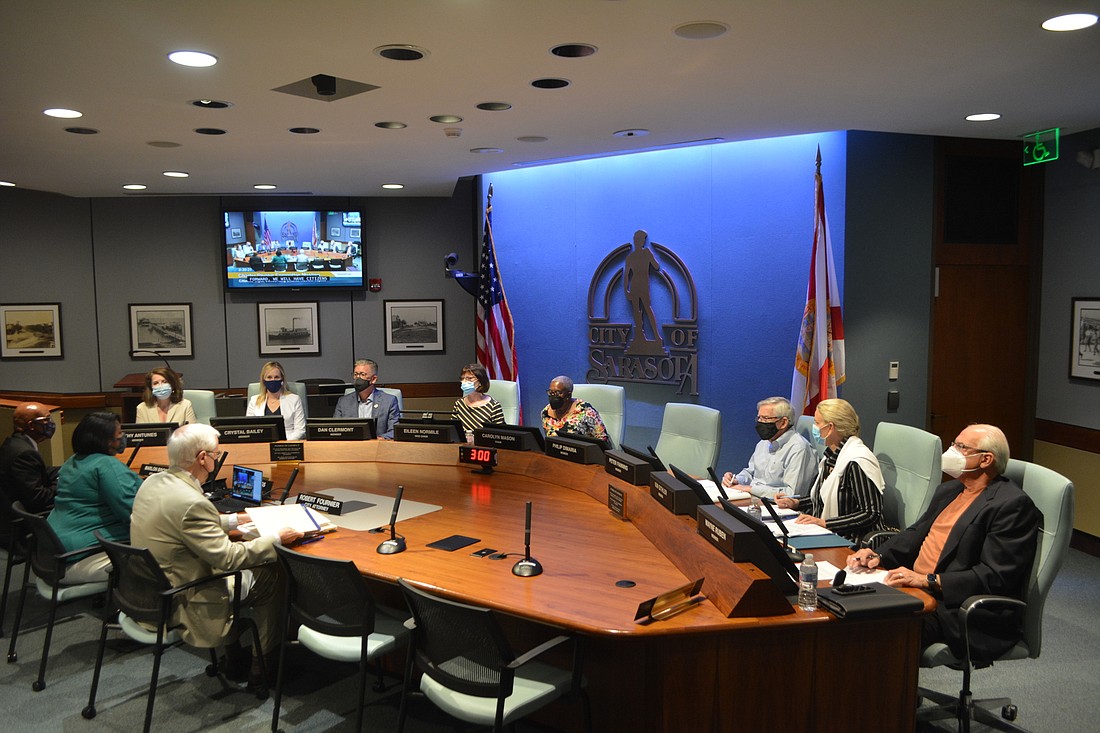- February 24, 2026
-
-
Loading

Loading

Starting from the beginning of the city’s foundational governing document, it didn’t take long for the Charter Review Committee to hit on a potentially controversial topic that could headline the board’s future recommendations to the City Commission.
Article I, Section 4 of the charter establishes the city’s form of government as a commission-manager system, with five elected commissioners overseeing a manager hired to serve as chief administrator. Since the late 1990s, there have been a series of efforts to alter that form of government and create an elected mayor. None have succeeded, but there remain vocal proponents of a major change to the hierarchy of the city government.
On Monday, the Charter Review Committee began its discussion of possible revisions to the commission-manager system as it examined the first three articles of the charter. The advisory group, which convenes once a decade to recommend charter amendments to the City Commission for consideration, held off on digging too deep into the issue. Instead, the board voted unanimously to hold a special meeting focused solely on matters related to the city’s form of government in October or November.
At the recommendation of board member Eileen Normile, the committee agreed to bring in an outside expert to help lead the discussion. Normile said an elected mayor could take many forms. A “strong mayor” is generally the chief executive in a mayor-council form of government. A system with a “weak mayor” reserves most legislative and executive power for the commission.
A commission-manager form of government can still have an elected mayor position, rather than the rotating mayor position that currently exists in the city, but that role remains largely ceremonial with no legislative power over the commission as a whole. Normile suggested hosting a presentation from a representative for the Florida League of Cities to get insight into the options that the committee might be able to consider.
“We throw these terms around — elected mayor, strong mayor, weak mayor,” Normile said. “I didn’t really know what the definitions were.”
The committee also agreed to examine potential changes to the makeup of the City Commission at a special meeting. Currently, there are three district representatives on the commission and two at-large members who are elected citywide. Committee member Dan Clermont proposed exploring the possibility of switching to a board composed entirely of district representatives, suggesting it could allow for a more direct connection between commissioners and constituents.
“There are cities where you have a dozen different city councilpeople and none that are at-large, and they have very small races and very close representation,” Clermont said.
The form and makeup of city government wasn’t the only item the committee explored Monday. Here’s some other topics the board addressed Monday:
There are two former city commissioners on the Charter Review Committee. Both of them were vocal advocates for increasing the salary for elected officials, which is $29,515 annually.
Committee member Carolyn Mason rejected the idea that serving on the commission is a part-time job. City Auditor and Clerk Shayla Griggs noted there is no language in the charter identifying city commissioner as a part-time job, calling that characterization a matter of perception.
“When I was elected in 1999, it was a full-time job, and today it’s only compounded,” Mason said.
Committee member Cathy Antunes suggested a salary of $60,000 annually, while other members suggested a formula tied to a metric, such as area median income. The board ultimately decided to explore its options for increasing the salary, but it was united in agreeing that a pay raise was a sensible idea.
“To me, it’s a matter of, do we take our government seriously here?” Clermont said.
Antunes proposed holding another special meeting to discuss establishing a procedure for dealing with allegations of commissioner misconduct in the workplace.
“Do we have to wait four years to bring accountability to our workplace, or can we have something that we put in our local constitution to say there’s a process for people who feel they’ve been aggrieved by your conduct?” Antunes said.
Mason questioned whether the mechanism for investigating and potentially reprimanding elected officials needed to be written out in the charter, suggesting instead the city manager could be empowered to lead the response to such an issue. City Attorney Robert Fournier noted there is a provision in the charter stating commissioners are only allowed to deal with non-charter staff members through the charter official who supervises them, but there is no provision for dealing with a violation of that rule.
Ultimately, the committee decided to take that issue up with the Florida League of Cities as well, agreeing to ask the group how other governments handle matters of censure and removal from office.
Committee member Crystal Bailey recommended revising a section of the city charter prohibiting discrimination to specifically state that discrimination on the basis of gender identity is not allowed.
The rest of the committee unanimously supported the proposal. City Attorney Robert Fournier noted the city has already adopted an ordinance prohibiting gender identity-based discrimination, but the committee agreed putting that protection in the charter would strengthen it.
At the suggestion of committee member Peter Fanning, the group also agreed to pursue the use of gender-neutral language throughout the charter.
Although one member of the public suggested the city should allow for partisan identification in commission elections, the committee unanimously agreed local races should remain nonpartisan.
“I think the nonpartisanship of the commission makes it much more of a cooperative commission, and I think it leads toward better end results,” committee member Philip DiMaria said.